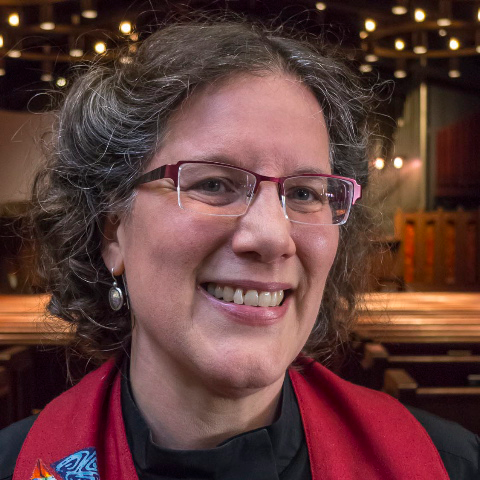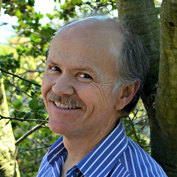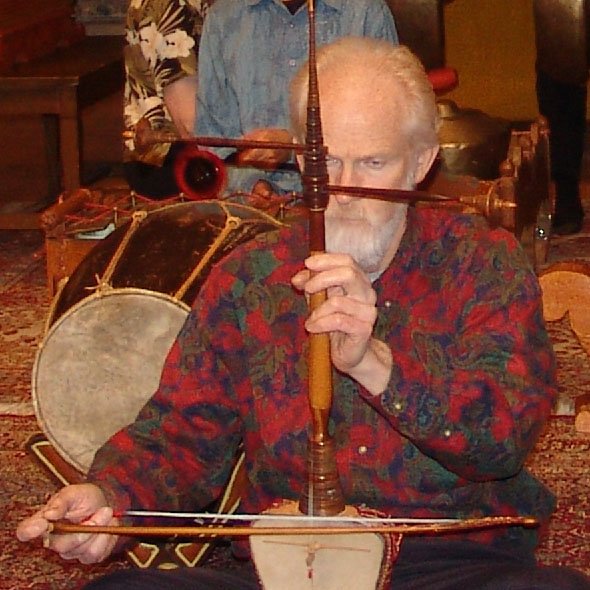Thank you for the invitation to join you today! I want to say a special thank you to your ministers and Merrin and all of the other members of your worship team. I’m sure you must realize that it takes a lot of thought and action and lots and lots of e-mails to put together a service like this, and you are blessed to have this excellent team of people here to serve you.
I’m very honored to be here and to have this opportunity to get to know you. As you may know, I just started as the District Executive last July. My job is to travel around the district and support the health and vitality of our congregations and communities, to help us find what is needed for the next steps in our faith, and to help us deepen in everything that we do. Along the way, I get to meet lots of people – clergy and lay people – who are really devoted to their congregations and to the communities they serve. Clearly you have people like that in this church too; I heard that you just completed a successful capital campaign, and in the coming months you’ll be electing new lay leadership, and doing your annual stewardship drive. So I thought it might be nice to take a few minutes today to reflect on devotion and what it might mean for us in our daily lives.
Before I start, though, I need to tell you a few things about my background so that you understand my relationship to devotion. I spent the first few years of my life attending the Unitarian Universalist Fellowship in Los Gatos. It was a good place to be. But my parents eventually fell away from it when I was five years old or so after some kind of disagreement on the Board (that does tend to happen!), and for a long time I wasn’t involved in any kind of organized religion.
But I continued to be interested in the spiritual life. In high school some of my closest friends were born-again Christians, and with their encouragement, I went to church with them occasionally. When I went to college, I continued to search for my religious identity and continued to go to Christian churches, hoping to find a place where I belonged. But going to church was excruciating to me, and here’s why: In those born-again churches at the time (maybe they still do this), they always ended the service with the minister saying something like, “and if your heart was touched today, and you are ready to give your life to Jesus, come on down to the front, and we’ll pray with you.” The problem was that I really, really wanted to experience that kind of devotion and give myself up just the way that they said. But I just couldn’t get myself to do it. I would sit in one of the back pews and just cry because I felt so isolated and stuck – wanting to join in and yet not being able to let myself go. It was horrible. (After a couple of years of this, I actually did go up to the front at the end of a service, and I became a Christian. It lasted one day. I respect Christianity a lot, but it just isn’t who I am.)
The longing for that kind of full-hearted, all-in devotion has never left me, though, and that’s what I want to talk about. I have an intense approach/avoidance relationship with devotion, and I suspect that others might too. But I think it is important to think abut devotion because there are depths of spiritual life that we can begin to touch when we let the energy of devotion into our lives.
I guess I should say what I mean by “devotion.” When I think about devotion, what I am mostly thinking about is that quality of not holding back. When we say that you are a devoted parent or a devoted 49ers fan or are devoted to your spiritual development, what we mean is that when you are watching your beloved team or tending to your child, you are offering all of yourself in the process – your love, your focus, your compassion, everything you have to offer at that moment. If you read devotional poetry, you find lots of images of this kind of whole-hearted giving. Here’s an example from the Sufi poet Rumi:
Love Dogs
One night a man was crying,
Allah! Allah!
His lips grew sweet with the praising,
until a cynic said,
“So! I have heard you
calling out, but have you ever
gotten any response?”
The man had no answer to that.
He quit praying and fell into a confused sleep.
He dreamed he saw Khidr, the guide of souls,
in a thick, green foliage.
“Why did you stop praising?”
“Because I’ve never heard anything back.”
“This longing
you express is the return message.”
The grief you cry out from
draws you toward union.
Your pure sadness
that wants help
is the secret cup.
Listen to the moan of a dog for its master.
That whining is the connection.
There are love dogs
no one knows the names of.
Give your life
to be one of them.
(From Coleman Barks & John Moyne, Trans., The Essential Rumi. Edison, NJ: Castle Books. p. 36)
I love this poem. Basically, what I get from it is that if you are devoted to something, the longing for it is the fulfillment of your longing. You don’t need to receive anything. Just realizing how deeply you long for union with (for Rumi) the divine, giving yourself fully to that reaching out – that is the reward itself!
Then I also love the last line – “give your life to be one of them.” In our culture we really value people who do this kind of thing, who are so devoted to the spiritual path, and to service, that their whole lives reflect it. The Dalai Lama. Mother Teresa. Thich Nhat Hahn. We so admire their focus and dedication and mostly, their ability to love so fully and with so few inhibitions.
So why are more of us not like them?
Because the spiritual path of devotion is not actually all that simple. Because along with the urge towards devotion comes, inexorably, the resistance to devotion. This, as you may already have realized, is the point of the story about our beloved Knight and our equally beloved Dragon. Being fully open-hearted, letting ourselves love someone or something unreservedly is actually fraught with lots of potential perils, no matter how much we sing about it on Sunday morning or watch it unfold on movie screens. When we are actually faced with the real possibility of experiencing devotion, it’s hard not to let the Dragon of Fear enter into our consciousness and start undermining our courage. You heard what she said: You’ll lose your individuality and become part of the faceless, brainless mob. You’ll look stupid and un-intellectual. And here’s one I particularly like: Once you open your heart, you won’t be able to stop, and you’ll end up giving up all your worldly goods and wandering through life in a tattered robe. Protect yourself! Don’t open up too much! It’s dangerous! That’s what the dragon says.
However, as often happens, something that sounds like a problem is also an opportunity. Working with the resistance to devotion, to opening up, can be a really productive, liberating spiritual practice.
There is a branch of Hinduism called the bhakti yoga tradition. Basically, it is the practice of devotion as a path to spiritual opening and spiritual union with the divine. The practices that people in this tradition do, like chanting and prayer, are designed to show the practitioners where they are opening up and where their self-imposed barriers are to devotion.
I spent a number of years in a group that did this kind of thing. We would do chants (which are basically group singing of the same set of words over and over again) that would go on for an hour or two or three or, in one case, eight hours. And just like was the case when I went to Christian churches in my youth, being in these chants was, especially at the beginning, excruciating. Here I would be in the midst of all of these people, singing their hearts out in praise of the divine in each of us, and I would feel completely and utterly alone. Have you ever had that happen to you? It can easily happen right here in church, too. It’s very frustrating. And what made it worse was that I knew in those moments that the separation I was feeling, the isolation from everyone around me, and terrible loneliness that overwhelmed me were all of my own doing! I would feel so stuck that I would want to run screaming from the room.
Overcoming our resistance to letting go and to devoting ourselves fully to our spiritual lives is a lot of work. It’s a lot of work because the stakes feel so high. And it’s a lot of work because those walls that we are putting up between us and others are deeply habitual and are fueled by the dragon of fear.
But, I can tell you from personal experience, it turns out that if you stay with it, it feels really good. When, finally, after years of resistance, I finally let myself join into those chants, I finally began to get why other people liked them so much. Keeping ourselves separate, like was doing, feels safe, in a way, at least temporarily. But it is ultimately really unsatisfying. But connection, which we can have truly and fully when we let down those walls between us and what is around us, feels good, even ecstatic. Because it’s in our nature to be connected!
So how do we do it? How do we let ourselves experience that amazing feeling of devotion and connection? Here’s what I’ve learned: the feeling follows the action. It’s not that you sit and develop all kinds of devotion and then, when you are finally good and ready, you dive in and show it. It actually goes the opposite way. You do something like chant or pray or help someone out or give money to your church, and then you notice “aha! So this is what devotion feels like. It feels great!” It’s just like a leap of faith – the faith comes after the leap, not before it.
Devotion feels good because devotion is nothing more than the opening of our own hearts. And just as Rumi said, it doesn’t matter that much if the recipient of our devotion is perfect, or does what we want, or even responds to us at all. We say these things all the time, of course. “Well, I can’t really love her fully because she says these stupid and hurtful things to me. I have to protect myself!” Or “I’m not going to give money to my church because I don’t agree with this decision that they made the other day.” The essence of devotion is, paradoxically, not about the object that you are devoted to. It is about you. It’s about your willingness and your capacity to open up. It’s about how much you want your heart and your love to be in the center of your life. It’s about how much like the Dalai Lama or Mother Teresa or Thich Nhat Hanh you can stand to let yourself be.
Ultimately, I think it all comes back to devotion as a spiritual practice, right here in Unitarian Universalism as much as anywhere else. It is a spiritual practice when at each moment we ask ourselves: How am I keeping myself separate at this moment from the people around me? How am I keeping myself separate from my heart? How am I keeping myself separate from God? What can I do to open up more to the connection with that infinite tenderness, as St. Catherine put it, that I so much long for?
Just like with any spiritual matter, though, don’t believe what I or anyone else tells you. Test it out for yourself. Do an experiment. Take some time and really devote yourself to this church. Give your time and your energy and your money to it without reserve. See what it feels like. I predict that you won’t lose yourself and that you won’t be shunned or feel humiliated or end up broke. Quite the opposite.
In fact, you might just feel like you have walked through the Gates into Paradise.
Amen.

















